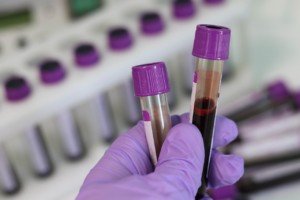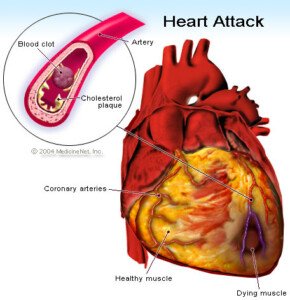
A simple and highly sensitive blood test can detect if you just suffered a heart attack–and this test is so super sensitive that it can detect even a mild heart attack.
The blood test is for an enzymatic protein called troponin. The troponin blood test for heart attack is highly sensitive and is considered the gold standard for determining damage to cardiac muscle.
“Cardiac enzymes are chemicals contained within heart cells,” says Christopher J. Hanifin, PA-C, who was previously a physician assistant in open heart surgery with Cardiothoracic Surgery of South Bend in South Bend, IN.
“Normally, they are essentially undetectable in the bloodstream,” continues Hanifin.
“When a person suffers a heart attack, cells in the heart die and rupture, releasing these enzymes into the blood where they can be detected.
“Diagnosis of a heart attack (myocardial infarction) is usually based upon the detection of elevated levels of these chemicals in the blood.”
If you go into an emergency room complaining of current or recent chest pain, the doctor or physician assistant will order a blood draw to check your troponin levels.
“So if a patient goes to the emergency department with chest pain and their cardiac enzymes tests are negative, are they in the clear? Not necessarily,” says Hanifin.
“It takes some time for cardiac enzymes to appear in the blood. If a patient is tested in the early stages of a heart attack, it is very possible that their levels will be within normal ranges.”
However, an elevated troponin level alone should not be used to outright diagnose heart attack.
Conditions other than heart attack can result in elevated troponin such as chronic heart failure , atrial fibrillation, kidney failure and a blood clot in a lung.
It’s never elevated by accident. As mentioned, this blood test is super sensitive.
So if the troponin is elevated, something has happened or is going on.
Chest Pain in the ER
The marvel of this blood test is that it can detect a heart attack that occurred more than a day previous, since troponin levels remain elevated in the blood for that long.

It can stay elevated for one to two weeks.
If you present with chest pain or a complaint of recent chest pain, a nurse will promptly take a blood sample.
Results may be in within 30 minutes.
Patients with chest pain and other worrisome symptoms may be told that the first test result is “normal.”
This is NOT a good time to leave the emergency room.
“A single negative test provides little useful information aside from establishing a baseline level,” says Hanifin.
“If the patient is held in the emergency department and several tests are drawn and compared over the course of several hours, a much more confident diagnosis can be made.
“If the levels remain steady, there is less grounds for concern. If the levels are rising – even within the range considered ‘normal’ – further investigation is warranted.”
Troponin takes a while to elevate if you’ve had a heart attack, so the second blood draw will be taken at least four hours later.
Depending on that result, a third one will be taken at least four hours later.
Hanifin explains, “The take-home message for both providers and patients is fairly simple.
“A positive test can be great at ruling a disease in, but one must be extremely cautious in assuming a negative test rules something out.”

 Christopher J. Hanifin
Christopher J. Hanifin







































